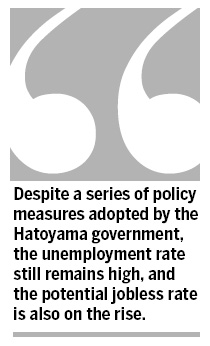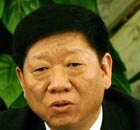Turbulence may hit region
Updated: 2010-06-04 07:54
By Liu Junhong (China Daily)

Hatoyama's resignation and trust crisis faced by the DPJ-led ruling coalition in Japan will have wider impact
Japanese Prime Minister Yukio Hatoyama's abrupt resignation Wednesday has plunged Japan into a fresh political crisis.
Hatoyama's brief reign will likely result in political turbulence in the island nation, especially since the former PM had failed to deliver on many of his promised political and diplomatic policies.
|
||||
However, during his eight-month rule, the Stanford-educated Hatoyama failed to resolve many problems, which he had promised to address during his election campaign.
Instead, the escalating contradictions within the DPJ and its coalition partners over a series of domestic and diplomatic issues increased the pressure on Hatoyama's government.
After it came to power in mid-September, the DPJ-led government proposed to break away from the country's long-controversial decision-making system built on a rigid bureaucratic set-up and promoted the establishment of a new policy-making mechanism.
But the high proportion of first-time DPJ lawmakers made consensus and unified policy making difficult, as they lacked the required political experience.
The lack of a clear coordination and communication mechanism with Japan's bureaucracy directly curtailed the DPJ-led government's policy-making efficiency and capability.
This, together with Hatoyama's failure to come up with effective ways to revive the economy in the context of the global economic slowdown, angered the Japanese public.
The downbeat economy added impetus to Hatoyama's resignation.
Japan's economy has failed to claw back even one and a half-year since the global financial crisis took root.
Despite a series of policy measures adopted by the Hatoyama government, the unemployment rate still remains high, and the potential jobless rate is also on the rise.
Compared with other developed nations where a large-scale tax reduction campaign was launched, Japanese enterprises faced heavy tax burden.
Paper's Digest

Chinese jet takes on Big 2
First large commercial plane set to ride on demand for aircraft as economy grows.
Super-CPU only for domestic eyes
Specials

Gaining ground
Doing business in china for westerners has come a long way, Peter batey says.

Safeguarding environment a priority
China continues to face mounting pressure to curb environmental degradation, despite progress in reducing pollution over the last five years, the environmental protection minister warned.

Employment to remain a continuing challenge
China's top labor official said the country will face a tough employment situation in the next five years.



